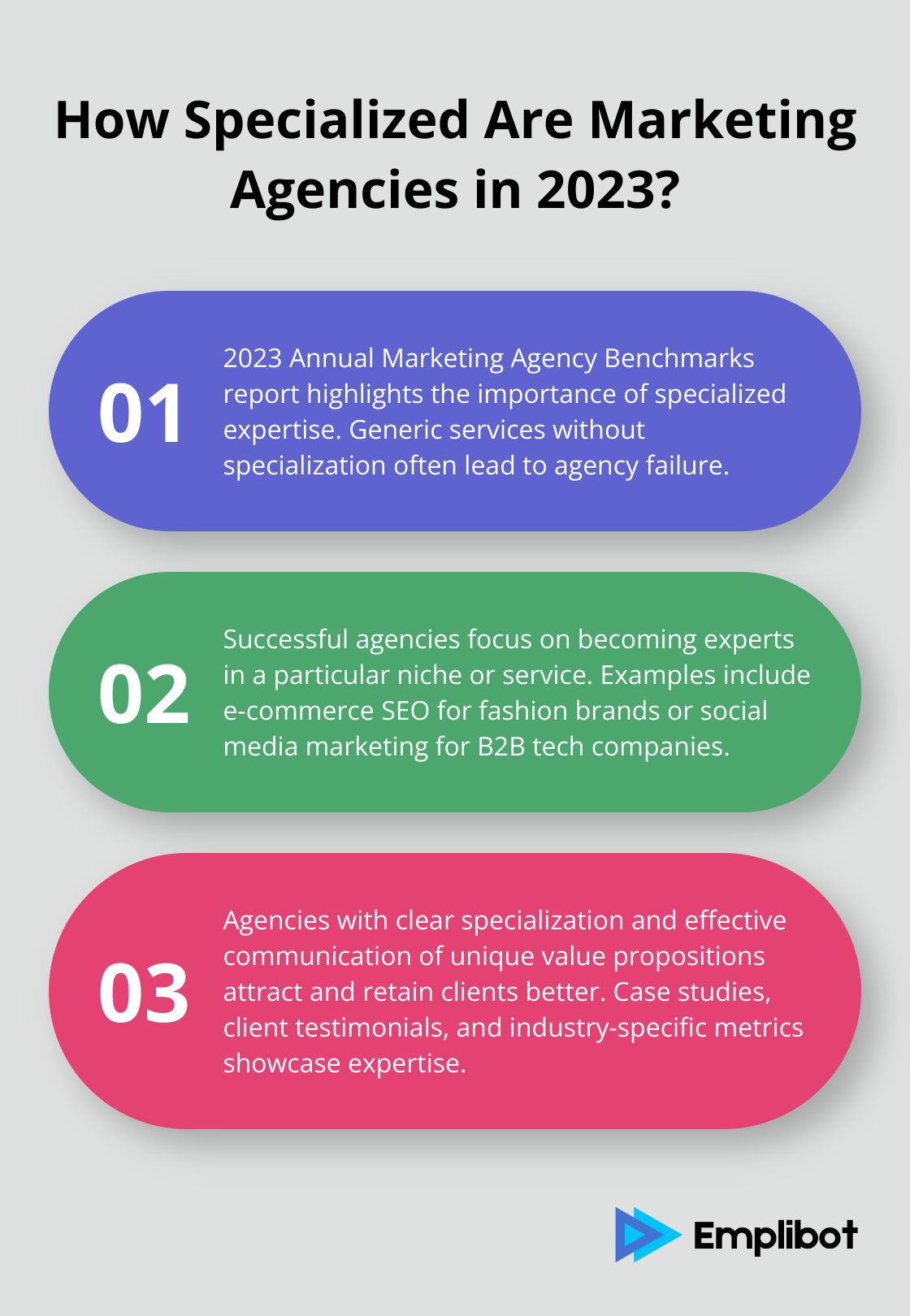Digital agencies are the backbone of modern marketing, yet many struggle to thrive in today’s competitive landscape. At Emplibot, we’ve observed numerous reasons why digital agencies fail, from strategic missteps to operational challenges.
Understanding these pitfalls is crucial for both established agencies and newcomers in the field. In this post, we’ll explore the top reasons behind digital agency failures and provide insights to help your business avoid these common traps.
Why Do Digital Agencies Blend In?
The Pitfall of Generic Services
In the digital marketing landscape, standing out is not just an advantage-it’s a necessity. Yet, many agencies struggle to differentiate themselves, often becoming indistinguishable in a sea of competitors. This lack of differentiation is a primary reason why digital agencies fail.

One of the biggest mistakes we observe is agencies offering a broad range of generic services without any specialization. While it might seem logical to cast a wide net, this approach often backfires. The 2023 Annual Marketing Agency Benchmarks report provides key insights into the growth and strategies of marketing agencies, highlighting the importance of specialized expertise.
The Power of Niche Expertise
Agencies that thrive often focus on becoming experts in a particular niche or service. For example, an agency might specialize in e-commerce SEO for fashion brands or social media marketing for B2B tech companies. This focused approach not only sets you apart but also allows you to command higher rates.
Communicating Your Unique Value
Even agencies with a clear specialization sometimes fail to effectively communicate their unique value proposition. Your website, marketing materials, and client pitches should clearly articulate what makes your agency different. Use case studies, client testimonials, and industry-specific metrics to showcase your expertise.
Leveraging Specialization for Growth
Agencies that clearly define and communicate their unique strengths are more likely to attract and retain clients in the long run. In a world where every agency claims to be “innovative” and “results-driven,” specificity and proven expertise truly set you apart.
The Role of Technology in Differentiation
Embracing cutting-edge technology can also help agencies stand out. For instance, agencies that leverage AI-powered tools (like Emplibot for content creation and distribution) can offer more efficient and data-driven services. This technological edge can be a significant differentiator in a competitive market.
As we move forward, we’ll explore another critical factor that often leads to agency failure: poor financial management. Understanding the financial intricacies of running a digital agency is just as important as mastering the art of differentiation.
Why Is Financial Mismanagement a Silent Killer?
The True Cost of Underestimating
Financial mismanagement often lurks as the hidden culprit behind agency failures. Many agencies fail to understand the true costs of running a digital business and the complexities of pricing in a rapidly evolving market. One of the most common financial pitfalls is the underestimation of project costs and timelines. A study reveals statistics about project management, including information on methods, salary, job markets, tools, and budgets. This miscalculation can quickly erode profits and strain client relationships. Agencies must implement robust project management tools and processes to combat this issue. Time-tracking software (like Harvest or Toggl) can provide accurate data on task duration, allowing for more precise future estimates.
Pricing Strategies That Work
Ineffective pricing strategies contribute significantly to financial woes. Many agencies undervalue their services to win clients, only to find themselves unable to deliver quality work profitably. A survey shows hundreds of marketing statistics and metrics on various aspects of digital marketing. To address this, agencies should consider value-based pricing models. This approach focuses on the value provided to clients rather than the time spent on tasks. It allows agencies to charge premium rates for high-impact work, improving their bottom line.
Cash Flow: The Lifeblood of Your Agency
Poor cash flow management can quickly sink even the most promising agencies. To avoid this fate, agencies should implement strict invoicing schedules and consider requiring upfront deposits for new projects. Additionally, financial management tools (such as QuickBooks or Xero) can help forecast cash flow and identify potential shortfalls before they become critical.
The Hidden Insights in Client Profitability
Many agencies neglect to track profitability per client, missing a crucial opportunity for growth. Not all clients are created equal, and some may actually cost the agency money. Agencies should implement a system to regularly analyze the profitability of each client account. This analysis might reveal that the largest client is actually the least profitable, prompting a reevaluation of service offerings or pricing structure.
Technology’s Role in Financial Management
Embracing technology can significantly improve an agency’s financial health. AI-powered tools can automate many financial processes, from invoicing to expense tracking. These tools not only save time but also provide valuable insights into an agency’s financial performance. (For instance, Emplibot offers features that can help agencies streamline their operations and improve profitability.)

As we move forward, we’ll explore another critical factor that often leads to agency failure: the inability to adapt to changing technology. This technological agility is just as important as mastering financial management in today’s fast-paced digital landscape.
Why Is Technological Stagnation Fatal?
The Cost of Ignoring Emerging Trends
In the fast-paced world of digital marketing, agencies that fail to keep up with technological advancements often find themselves obsolete. The digital landscape constantly evolves, and agencies that don’t adapt risk losing clients to more innovative competitors.

A report by Gartner reveals that 80% of digital marketing leaders find performance measurement a difficult exercise. This statistic underscores the importance of staying ahead of the curve. Agencies that ignore emerging trends like voice search optimization, AI-driven personalization, or augmented reality advertising miss out on lucrative opportunities.
To stay relevant, agencies should allocate resources for trend research and experimentation. This might involve setting aside a portion of the budget for testing new technologies or partnering with tech startups to gain early access to innovative solutions.
The Imperative of Continuous Learning
In an industry where change is the only constant, continuous learning becomes essential. A survey by the Digital Marketing Institute found that 82% of marketing professionals feel that there is a significant skills gap in the digital marketing industry. This gap often stems from a lack of ongoing education and training.
Agencies can address this by implementing structured learning programs for their teams. This could include regular workshops, online courses, or attendance at industry conferences. (Google’s Digital Garage offers free courses on various digital marketing topics, which can serve as an excellent starting point for team upskilling.)
Overcoming Resistance to New Tools
Resistance to adopting new tools and platforms can severely hamper an agency’s efficiency and competitiveness. A study by McKinsey revealed that companies that are slow to adopt digital technologies are 23% less profitable than their more tech-savvy counterparts.
To overcome this resistance, agencies should focus on demonstrating the tangible benefits of new tools to their teams. This could involve running pilot programs to showcase improved productivity or client outcomes. Additionally, involving team members in the tool selection process can increase buy-in and adoption rates.
For example, when introducing a new project management tool, agencies could start with a small team trial, gather feedback, and use the success stories to encourage wider adoption. (Tools like Asana or Monday.com often offer free trials, allowing agencies to test their impact before committing.)
Embracing AI and Automation
The rise of AI and automation in digital marketing presents both challenges and opportunities for agencies. Those who fail to integrate these technologies risk falling behind competitors who leverage AI for more efficient and effective campaigns.
AI-powered tools can streamline various aspects of digital marketing, from content creation to data analysis. (For instance, Emplibot automates content creation and distribution across multiple platforms, offering a comprehensive solution for agencies looking to enhance their content marketing efforts.)
Agencies that embrace AI and automation can offer more sophisticated services to their clients, such as personalized marketing at scale and real-time campaign optimization. This technological edge can significantly improve client outcomes and agency profitability.
Final Thoughts
Digital agencies fail for various reasons, including lack of differentiation, financial mismanagement, and technological stagnation. Successful agencies carve out unique niches, communicate their value clearly, and deliver specialized services that meet specific client needs. They also understand the importance of robust financial management and embrace technological advancements to enhance their service offerings.

The digital marketing world constantly evolves, and agencies must adapt to stay competitive. This adaptation involves staying ahead of emerging trends, investing in ongoing education, and adopting new tools and platforms. Agencies that position themselves as forward-thinking partners can deliver cutting-edge solutions that drive real results for their clients.
Tools like Emplibot can help agencies streamline their operations and enhance their content marketing efforts. Agencies should regularly assess their practices, identify areas for improvement, and implement strategic changes. The most successful agencies view challenges as opportunities for growth and innovation in the competitive digital landscape.

